

Teaching. Working in Groups. Humor. Mind-Mapping. Want to be more creative at work? Be happy! Time Management. Collab. Books | References. Pages · rdrewd/collaboration Wiki. Markdown. Download Markdown 1.0.1 (18 KB) — 17 Dec 2004 Introduction Markdown is a text-to-HTML conversion tool for web writers.
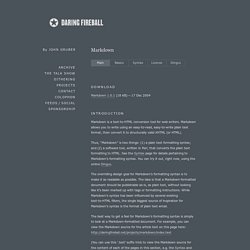
Markdown allows you to write using an easy-to-read, easy-to-write plain text format, then convert it to structurally valid XHTML (or HTML). Thus, “Markdown” is two things: (1) a plain text formatting syntax; and (2) a software tool, written in Perl, that converts the plain text formatting to HTML. The overriding design goal for Markdown’s formatting syntax is to make it as readable as possible.
The best way to get a feel for Markdown’s formatting syntax is simply to look at a Markdown-formatted document. (You can use this ‘.text’ suffix trick to view the Markdown source for the content of each of the pages in this section, e.g. the Syntax and License pages.) Markdown is free software, available under a BSD-style open source license. Discussion List I’ve set up a public mailing list for discussion about Markdown. Installation and Requirements Movable Type Blosxom BBEdit.
WikiSyntax - support - The reference to the wiki syntax for Google Code projects - User support for Google Project Hosting. Each wiki page is stored in a .wiki file under the /wiki directory in a project's repository.
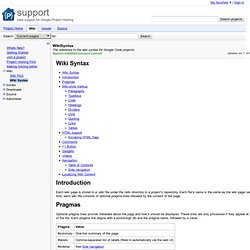
Each file's name is the same as the wiki page name. And, each wiki file consists of optional pragma lines followed by the content of the page. Optional pragma lines provide metadata about the page and how it should be displayed. These lines are only processed if they appear at the top of the file. Each pragma line begins with a pound-sign (#) and the pragma name, followed by a value. Paragraphs. Collaboration. 10 things Gen Y do online.. and shouldn't. The Generation Y.
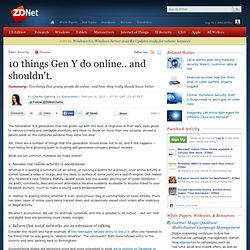
A generation that has grown up with the buzz of ringtones in their ears, eyes glued to various screens and computer monitors, and have no doubt on more than one occasion shoved a parent aside on the computer because they were 'too slow'. Yet, there are a number of things that this generation should know not to do, and it still happens -- from falling for a phishing scam to trusting self-generated company product reviews. What are ten common mistakes we make online? 1. Assume our online activity is anonymous Whether it is posting a comment on an article, or running a search for a product, your online activity is stored. In relation to posting online, whether it is an 'anonymous' blog or commentary on news articles, there has been cases of online users being tracked down and occasionally issued court orders after malicious or illegal activity. We aren't anonymous. 2. 3. Personal data.
Inappropriate Facebook pictures on your profile really could lose you a job. Researchers warn of increase in employers checking candidates social networking profileLifestyle, attitudes and even your appearance in photos can matter By Mark Prigg Published: 14:34 GMT, 23 July 2012 | Updated: 15:04 GMT, 23 July 2012 Your Facebook profile really could lose you a job, researchers have found.
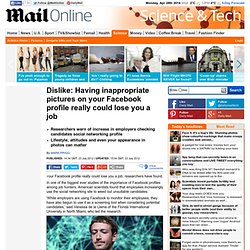
In one of the biggest ever studies of the importance of Facebook profiles among job hunters, American scientists found that employees increasingly use the social networking site to weed out unsuitable candidates. 'While employers are using Facebook to monitor their employees, they have also begun to use it as a screening tool when considering potential candidates,' said Vanessa de la Llama of the Florida International University in North Miami, who led the research. Pause for thought: Employers are increasingly checking the Facebook profiles of potential staff. Joe Kraus - Culture of Distraction. A few weeks ago I gave this rough presentation on a topic called “SlowTech”.
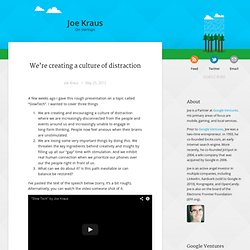
I wanted to cover three things We are creating and encouraging a culture of distraction where we are increasingly disconnected from the people and events around us and increasingly unable to engage in long-form thinking. People now feel anxious when their brains are unstimulated.We are losing some very important things by doing this. We threaten the key ingredients behind creativity and insight by filling up all our “gap” time with stimulation. And we inhibit real human connection when we prioritize our phones over our the people right in front of us.What can we do about it? I’ve pasted the text of the speech below (sorry, it’s a bit rough). Remarks for SlowTech talk – CONSTANT CULTURE OF DISTRACTION I want to start with some imagery of the way we live today. I want to talk three things tonight As a culture, we’ve got a crisis of attention. Part 1. I don’t think I have a healthy relationship with mine.
Inside Collaboration Now Archive.